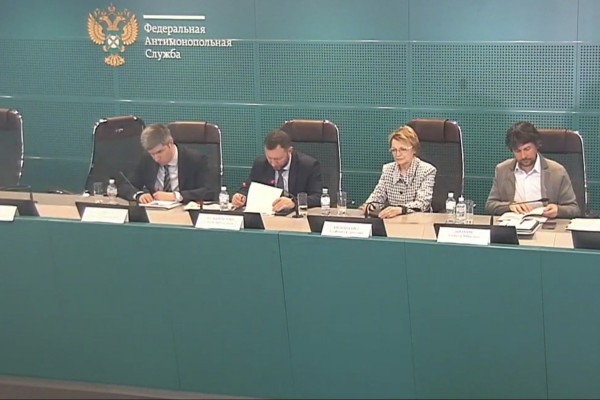On April 19, the BRICS Competition Law and Policy Centre held a roundtable on Competition and Intellectual Property under Sanctions. The event was held within the framework of the XXIII April international scientific conference on the problems of the development of the economy and society.
The experts discussed measures to stimulate the economy in the face of sanctions by weakening the protection of intellectual property rights of foreign right holders without completely abandoning the protection of intellectual property. Such measures include the full legalization of parallel imports, the intensification of compulsory licensing tools, the rejection of “antimonopoly immunities”, etc.
The round table was moderated by Alexey Yuryevich Ivanov, Director of the BRICS Competition Law and Policy Centre and HSE — Skolkovo Institute for Law and Development.
The event was attended by:
- Karina Maratovna Taukenova, Deputy Head of the FAS Russia;
- Timofey Vitalyevich Nizhegorodtsev, Deputy Head of the FAS Russia;
- Mukhamed Anatolyevich Khamukov, Deputy Head of Department for Cooperation with Government Authorities, Ozon;
- Alexey Igorevich Dukhanin, Director for Development of Relations with Government Authorities at Wildberries;
- Anatoly Vyacheslavovich Semenov, Deputy Chairman of the Committee of the Russian Union of Industrialists and Entrepreneurs (RSPP) for Intellectual Property;
- Vladimir Alexandrovich Sivitsky, Professor of the Department of Constitutional and Administrative Law, Faculty of Law, National Research University Higher School of Economics - St. Petersburg;
- Elena Anatolyevna Voinikanis, Leading Research Fellow at the BRICS Competition Law and Policy Centre.
In the opening speech Alexey Ivanov stressed that Russia had adopted a regime for the protection of intellectual rights, which did not correspond to the level of the country's socio-economic development and its national interests.
“Antimonopoly immunities”, a ban on parallel imports, the restrictive concept of “compulsory licensing” and other severely restrictive forms of intellectual property protection have led to a long-term stagnation of the Russian innovation economy and continue to block the technological growth of companies and reduce their competitiveness in the global market.
“Isn't it time to simply systematically abandon these institutions that hinder our development? I see the lifting of these restrictions not as an extraordinary measure aimed at fighting sanctions, but as a normal mechanism for reviving our economy. Normal, that is, in line with world practice and our international obligations.”
Lifting the ban on parallel imports, compulsory licensing and the abolition of “antimonopoly immunities” is not a sanction, but a normal planned economic measure, Karina Taukenova agreed. She recalled that it was possible to achieve the adoption of Federal Law No. 46 of March 8, 2022, which gives the Government the right to draw up lists and categories of goods for which parallel imports are allowed. Decree No. 506 was also introduced, according to which the Ministry of Industry and Trade approves the list of goods.
“We believe that it is wrong to choose the way of creating a list of goods, but I understand colleagues who have been trying to do at least something for the last 10 years. I do not rule out that both of these legislative acts will be amended in the near future. We want to agree that each member of the EAEU has the right to determine the principle of exhaustion of rights for itself. It is detrimental to follow the path of a list of goods, since we cannot agree within the country on what kind of goods these should be, let alone five countries, each of which is bound by its international obligations.”
Timofey Nizhegorodtsev drew attention to the “colonial character” of the legal system of the Russian Federation.
“Many laws were written under the influence of those markets that wanted to subdue us. Colonialism is, after all, including the intellectual control of ideas and meanings, which then form the norms of law”,
he pointed out.
Also, Mr. Nizhegorodtsev noted that the actions of the state in relation to the right holder are often perceived as “the actions of a bandit”, while the unfair behavior of the right holder itself is ignored, as in the case of the American pharmaceutical company Gilead, which refused to supply the drug remdesivir against COVID-19 to Russia on a non-discriminatory price. As a result, the Government of the Russian Federation issued a compulsory license for the production of “Remdesivir” to the Russian company Pharmasyntez.
Vladimir Sivitsky commented on the contradiction between Federal Law No. 46 and the Civil Code of the Russian Federation, noting that the categories of choosing a priority in comparison with the Civil Code of the Russian Federation are not very applicable to this law, since it is part of an extraordinary and temporary legal regulation under sanctions.
“The current regulation is more properly regarded as extraordinary. Perhaps now we are in that very transitional period from the principle of national exhaustion of rights to the principle of international exhaustion. Of all the measures, I would now give priority to the abandonment of “antitrust immunities” and the use of compulsory licensing - this is a familiar and understandable model. And the transition to the international principle of exhaustion of rights is a matter for the future.”
Anatoly Semenov presented an overview of the development of Russian legislation in the field of intellectual property circulation and its inherent problems and shortcomings. In particular, instead of abolishing the norms on the protection of intellectual property rights, the Government merely abolished the norms restricting their protection. No emergency regulation can justify such a legislative marriage, Mr. Semenov is convinced.
“I am glad that our lawsuit against the Government of the Russian Federation to challenge Decree No. 506 was filed with the Supreme Court and reached the addressee. The story with the lists of the Ministry of Industry and Trade causes boundless mistrust. What goods will be included in the list, what will be pulled out of it? We understand that all this will not be free of charge. It’s just that instead of customs, the Ministry of Industry and Trade will do this, ”,
Semenov believes.
Alexey Dukhanin noted that the fears expressed by opponents of the legalization of parallel imports are largely untenable.
“A frequent argument against is the lack of warranty service. But there are already practices that help protect the consumer. The seller of the marketplace is obliged to provide warranty service. Otherwise, the buyer will be reimbursed either by the seller or the marketplace.”
Mukhamed Khamukov recalled the current situation on the trading floors:
"Prices have gone up by multiples. We are running out of goods on the stock exchanges. In addition, it is worth remembering that marketplaces are hundreds of thousands of sellers, they are the same small and medium-sized businesses that would benefit greatly from parallel imports. There is an opinion that this measure does not contribute to the localization of production. But why are brands localized in Russia afraid of competition with themselves?"
Summing up the meeting, Elena Voinikanis emphasized once again that the weakening of the protection of intellectual rights of foreign right holders is a measure that returns to normal. She also noted the need for a “broad palette of influences or narrative expansion” in shaping the intellectual property architecture.
“The architecture of intellectual property is changing now. It is important to understand what is happening outside of Russia in this area and what lessons we are ready to draw from this. For example, Brazil and India are actively discussing with the EU and the US the suspension of TRIPS provisions due to the pandemic. The acute phase, when the West denied any changes, has already passed, the EU and the US are already ready to sacrifice vaccine patents”,
she noted.
Following the results of the round table, Alexey Ivanov proposed a resolution:
“Fully legalize parallel imports, introduce the international principle of exhaustion of rights, remove “antimonopoly immunities”, adjust the intellectual property protection regime so that compulsory licenses really work.”
The participants agreed to assemble an initiative group for further work on the provisions of the resolution.




